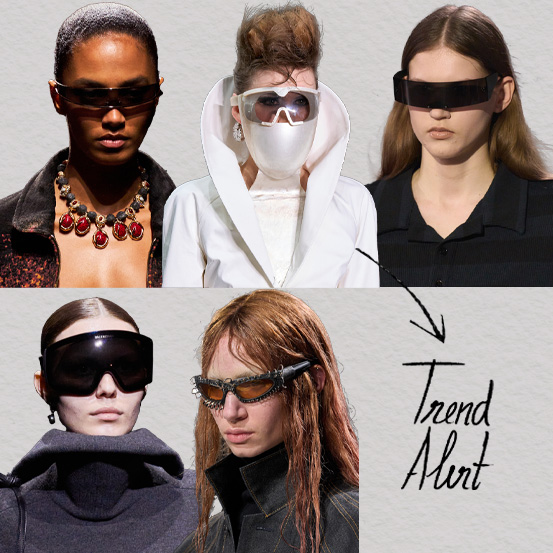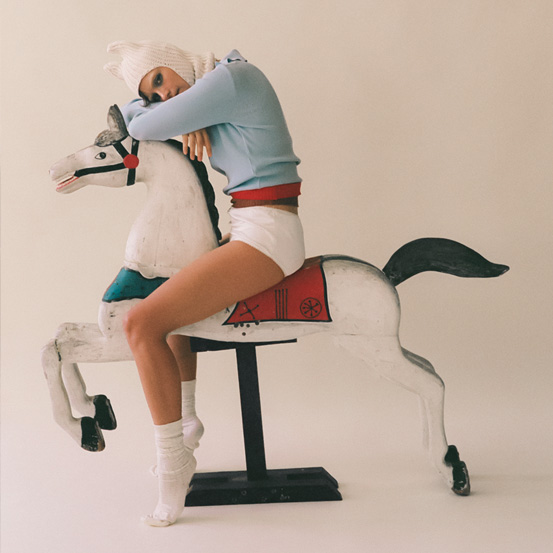There’s hope in professional rivalry: when brands and designers wear each others shirts, there’s no competition for the prosperity of all. Because divided we will continue to fall; but united is still what makes us stand.
There’s hope in professional rivalry: when brands and designers wear each others shirts, there’s no competition for the prosperity of all. Because divided we will continue to fall; but united is still what makes us stand.

Artwork by João Oliveira.
Artwork by João Oliveira.
If you’ve ever seen shows on fashion weeks, you’ll know that not only editors, buyers, celebrities and influencers seat on the front row. The peers, the colleagues, the friends - even if that friend has a competing brand - are also there. It doesn’t mean that there’s no rivalry within the Fashion industry; as in any area, there are the ones that play the game in the worst way possible and those who believe there is no game to be played, just roads to be chosen – each one walks their own path the best way they know how. In the Portuguese Fashion industry, namely the designer one, the latter seems to be particularly true. As a pawn in the industry for almost two decades, the opportunity to confirm this kind of support firsthand have been countless, starting off with watching designers seat in other designers’ fashion shows - I always remember seeing Buchinho at Nuno Baltazar’s and vice verse; I remember Pedro Pedro at Alexandra Moura’s, Luís Carvalho supporting many of them and many of them at Dino Alves. The setting keeps repeating in almost every one of the names that make “Made in Portugal” a métier, giving a new dimension to the phrase “keep your friends close and your enemies loser”. Except that in this version that’s sewn with supportive thread, there’s no hidden motifs or agenda. It’s genuinely an act of comradery, even though t may not always be visible or have the availability for an even bigger comradery. And even though there may be one designer or another not completely on board with this concept, the voices that defend it speak louder.
“I usually try to have my work organized so that during ModaLisboa (and ocasionally during Portugal Fashion) I am able to see my colleagues shows, I think it’s important to do it in several levels, but bottomline, to support them, hear them out, share advice, understand which path they are taking.”, explains fashion designer Luís Carvalho, owner and founder of the brand with the same name. All our interviewees are designers with their own namesake label, built of hard work and an enormous dedication to fashion design in Portugal. Susana Bettencourt is one of them and confirms this idea of helping one another: “I frequently talk to my peers, we have a sense of helping each other that’s huge, be it by sharing contacts, tech help, depending on the area of expertise and knowledge of each of us (we’re all different); exchanging ideas about events, international fairs, sales, business, organization, structure and preparing materials to sell. We also talk a lot about our difficulties and solutions for it, of the current panorama and how we’re going to face obstacles. I believe several minds thinking and adding value diminishes the risk and the taking from it is much bigger! Besides, I always follow their work, be it digitally and/or on the actual fashion shows, whenever I can. I also feel a massive support and respect from their part, which is tryly rewarding.”, she adds. Which doesn’t mean that help help and support can’t fail, at times: “We’re multifaceted professionals and we do different jobs within our own companies. We end up drowned in our own problems, dedicating them our full attention, ignoring the most obvious thing: we all go through similar problems. Therefore, if we dedicated more time to sharing those problems and the solutions for them, we would have accomplished more and in a shorter period of time. This lack of communication between us ended up creating some sort of isolation and mistrust. I, myself, even though being of latin descent, which makes the group spirit and communication sort of part of my DNA, saw this will being attained very early and assumed that defensive position as well, ending up mimicking the attitude that surrounded me.”, weighs in Katty Xiomara, adding that the support sense is, nevertheless, bigger and bigger: “today, i feel more confident and secure, I know this territory and I know that many of us are now able to understand that wisdom is conquered through sharing, that we grow when we listen to an advice and we get richer inside when we share our own advice. When I share hours of work with colleagues on international fashion shows, I understand we can exchange ideas and visions. We spend 12 hours or more together per day and end up, thus, getting to know each other better, knocking down a couple of myths that we’ve built ourselves on one another. In Milan, for instance, Alexandra Moura travelled with her team and, on the day of the show, they all came backstage ready to help out! More than the amazing help that indeed was in need, it was the gesture that deeply moved me.” This kind of initiative isn’t a strange move to Moura, which, besides making this act of supporting whoever a sort of personal philosophy, has already opened her store doors so that her peers could show and sell their own creations, in a time when few of them had a store with a window to the street: “I’ve always had a life motto, which is ‘do unto others as you would have them do unto you’, and it’s in this way that I try to act with others. At the time when I had my brick and mortar shop, Alexandra Moura Ma+s, one of the projects I was most proud of and that gave me enormous pleasure was ‘Store in Store’, where I invited other Portuguese designers to literally invade my shop with their collections. I’d remove my collection to the back nd the store front would be occupied by a fellow’s work, there were actually several names there. At this time, whenever possible, I love going and watching a show, seeing a designer friend’s work is to, in some way, feel we did it! I feel precisely that with some of my fellow designers, seeing them on my shows, knowing they’re following my work and show it is truly beautiful.”
What’s truly beautiful is to see that, even with all the exceptions that may exist, like in all areas, it’s a given that this friendship and mutual professional respect is alive and kicking, or, at least, there’s this outspoken will that it continues and flourishes. But knowing that it exists and applaud it, worthy of praise in itself as it may be, also brings hope in dimensions that go beyond an emotional one. To support, follow and admire a colleague’s work is to elevate a competitor’s brand, but also your own, because when the area experiences success, all brands within that market profit from that prosperity. After all, when an area gains more audience, when a label gains new admirers, they will search for other labels within that market. Above all, they will serve as an example to others and will share obstacles and successes: “we’re a working class that’s fairly new in society and, as such, it’s not easy being understood. We’re creative beings, forced to manage businesses and, because of that, there’s nothing like a peer to understand what we’re going through”, says Susana Bettencourt, elaborating on this idea. “In the same way, I believe the recognition of a Portuguese designer brand ends up affecting us all. Therefore, if we believe in the cooperation towards a common good, the public will tend to respect and trust our work more. On the other hand, if something goes south for one of us, designers, it may create some king of mistrust within the audience and partners. One’s problem is everyone’s problem.” “In different ways, we all feel the same ‘illnesses’, we know way too well the struggle we need to face to be able to move on and grow, and that makes us sort of in the same boat”, suggests Alexandra Moura. “Support makes us stronger, helps our endurance, makes us humbler and more grateful for it all. Let’s have each other’s back”, she points out. Luís Carvalho corroborates: “I feel it’s important, because only we know the difficulties which we go though for having a fashion brand in Portugal. Besides, we already live in such a small country that I feel this only makes sense if we support each other.” Xiomara is on point when sharing why it’s relevant supporting the ‘competition’: “Because it feels good! Yes, in fact helping is a pretty selfish act because it makes us feel good, but it’s not just that. Mutual support enrich us globally as a professional class which, thus, values each and every one of us. Only like this may we, one day in the future, be a bigger highlight internationally.”
So, it is possible to balance friendship and admiration and support within a competing ground? Is there hope in a joint work, or at least mutually supported, within an industry that should be, more than ever, recovering, moving forward, thriving? “Of course there is! Starting off by not calling it rivalry”, we have no comeback for Luis Carvalho’s well said words. “We all have our identity, so we have different clients, styles and points of view. I have a good relationship with almost everyone in the business and admiration for a lot of them. It’s like we’re school mates and there’s that healthy competition. We all have our work, our own way of doing things, we only have to figure out that in a next time, we need to work even harder to be even better.” Bettencourt agrees with this idea of being united in their differences: “yes, it is possible to attain balance between admiration, friendship and competition because, even though we’re all different, with different aesthetics, messages, specialties and missions, we’re a creative community that learns with itself and with others. There are several active generations, many of us have worked with more experienced designers and, from that learning, we’ve managed to, today, become mentors for new generations. You learn a lot throughout the process and with both sides of the road walked on. The truth is our sector is yet to be truly supported by the general audience, which demands a far greater effort in being united to change this Portuguese stigma that the foreign product is worth more than our own. To break this chain of thought, we must all give our best and understand that one’s achievements is everyone’s achievements!” To which Alexandra Moura adds: “Yes, it’s completely possible. With respect, ethics, individual dignity, professionalism and good character. Essential ingredients for friendship and respect amidst competition.”
I arrive to the end of these lines feeling deceived. I though I was writing a text about competition and ended up with an article about friendship. I though I was going to write a text about obstacles and ended up writing an article on hope - as a whole. I though I was going to write a text on strategy and ended up writing an article on prosperity. I though I was going to write a text with lots of ‘buts’ and ‘ifs’, but this article had only a few, after all. We know they can’t (or we can’t) always be there for one another, but the will to unite around a result that favors all is obvious and surpasses all potential and occasional absents of support. “Even when there wasn’tt a lot of dialogue between us, I think competition never stood itself above admiration; true admiration doesn’t let itself be outshined by the fear of competition, quite the contrary, it should be increased by it. As for friendship, it can only manifest itself when the support truly exists, when we’re able to give and take effortlesssly. If we all communicate more and better, we can destroy fear and mistrust so that the true friendship conquers ground among us”, Katty Xiomara ends with a note - and we wish that, more than an advice, it becomes a mantra of hope.
Translated from Vogue Portugal's Hope issue, out September 2020. All credits in the original articles.Texto em português na edição em print.
Most popular


Editorial | The Naif Issue, fevereiro 2026
03 Feb 2026

Relacionados
.jpg)
.jpg)



